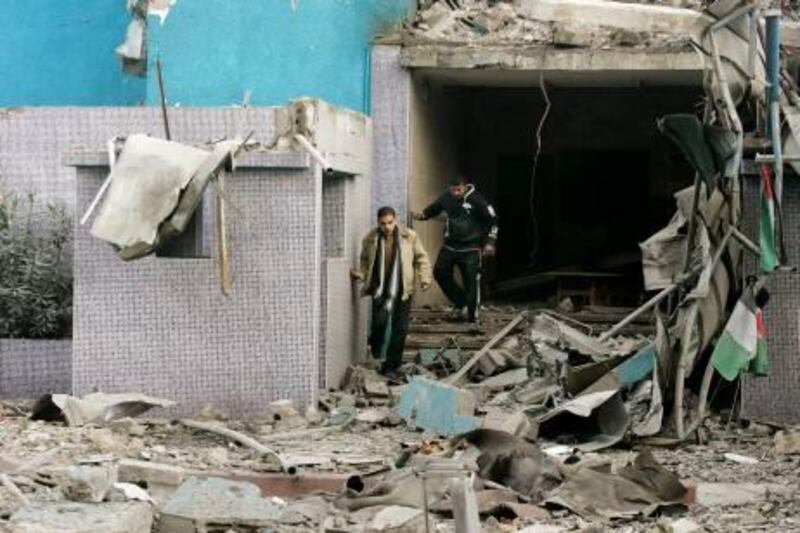GAZA CITY // It is a memory that haunts Ibrahim Habib and other Gaza police officers every day.
Two years ago yesterday, a barrage of rockets cut down dozens of police cadets at a graduation ceremony in the Hamas-controlled coastal strip, in the opening salvo of Israel's Operation Cast Lead.
By the time the onslaught ended 22 days later, up to 1,400 Palestinians, including 248 police officers, were dead and swaths of Gaza reduced to rubble. Thirteen Israelis died.
For Mr Habib, December 27, 2008, is a grisly reminder of the perils that he and fellow staff members at the Palestine Police College face when attempting to train Gaza's next generation of policemen.
"If Israel wants to fight the resistance, that's fine," said the 38-year-old police officer, who is the college's vice dean. "But they don't have the right to attack police officers."
Even so, he is taking no chances.
Instruction at the college in the old Palestine TV building in Gaza City, which enrolled its first class in 2009, resembles a training course for a militia forced to work underground.
The college offers a bachelor's degree in law or a two-year diploma in police studies, but course timetables are not available to the public and classes are often held at undisclosed locations. To elude the Israeli military, cadets sleep at home - far away from each other - and are taken to classes by bus.
Faculty members bristled when questioned about the details of cadet training. "That's a secret - we can't tell you that," barked Colonel Samir Issa, 41, a thickly bearded, senior administrator at the college. He would say only that "we have to keep in small groups and apart from each other so they won't be an easy target".
Mr Habib said such subterfuge was necessary to train his 250-plus cadets properly and safely.
The training and course work are still top-notch, he said, with classes that cover topics ranging from fighting drug trafficking, forensics and counter-terrorism, to seminars on criminal law and due process.
While Islamist political theology dominates the world view of much of Gaza's leadership, Mr Habib demands that his cadets put aside ideology for the sake of maintaining public order.He admits that some cadets have participated in militant activities, but the school’s policy is automatic expulsion for those found doing so.
Some Gazans question the effectiveness of these guidelines. They say nepotism in their police force is rife and officers too often resort to brutality in the line of duty.
“Unfortunately, the police are highly politicised and highly theologised,” said a former police instructor for the Palestinian Authority (PA) police in a United Nations-run programme in Gaza.
“We are not a military academy,” insisted Mr Habib, whose clean-shaven face and neatly cropped hair set him apart from the appearance of most Hamas officials. “We have nothing to do with resistance,” he said.
Israel disputes this, arguing that it has reason to believe that Hamas police have participated in activities of the group’s militant arm, the Izzadin al Qassam Brigades. In March, the Israeli military said Hamas police officers had joined with militants shortly before its war on Gaza. It argued that this made the police legitimate targets.
The result of the UN investigation into the Gaza war, the Goldstone Report, takes issue with this claim. Richard Goldstone, the former South African judge who led the investigation, wrote that he “could not verify the allegations of membership of armed groups of policemen” employed by the Hamas government.
While Operation Cast Lead did not create the problems that beset policing the Gaza Strip, even before Hamas took over in 2007, it has certainly complicated them.
Hamas officials admit that training for general recruits is substandard. New traffic-police recruits, for example, are often told to report for duty the day they sign up for the force. Training occurs mostly on the job and in small units – a deliberate strategy by commanders to get bodies patrolling the streets rapidly while not presenting too big a target for the Israeli military.
But Mr Habib insists that his college’s training is highly professional. Moreover, he is receiving support from an unlikely source: officers who served in Gaza’s former PA government.
While thousands of them have stayed at home while remaining on the PA’s payroll – a deliberate strategy by the government in Ramallah to undercut its Hamas rival – about a third of the college’s instructors served as policemen in the previous government.
“The guys from the former PA government have shown a great effort in helping the cadets because, as you know, there is a serious lack of experience as far as qualified training is concerned,” said Mr Habib, who also served in the PA government.
Indeed, since other countries have refused to participate in the training of Hamas policemen, the college has brought in former PA officers. Before Hamas came to power, PA-affiliated police officers, like the rest of Gaza’s policemen at the time, received training from experts from western and neighbouring countries.
In the hallways of the college, cadets expressed enthusiasm about their training.
Some of them bearded, some of them not, they stood to attention in dark-blue uniforms, saluting Mr Habib as he toured the facility’s dilapidated facade of shattered windows and paint-chipped walls.
“There’s a feeling here that you can excel as a policeman without having wasta,” said Mahmoud Haddad, 19, a first-year cadet.
“Before, you couldn’t get anywhere unless you had an influential father or family member,” he said.
And while the spectre of another Israeli war on Gaza looms in the back of the cadets’ minds, they say they are still prepared to risk wearing the police uniforms of a government that Israel regards as its mortal enemy.
Asked if he was loyal to Hamas, Cadet Haddad said: “We are here only to serve our country as policemen.”





